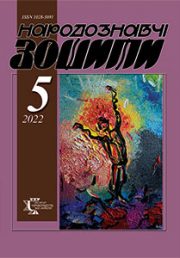The Ethnology Notebooks. 2024. № 1 (175), 119—130
UDK 340.123(100)”17/19″:343.37
DOI https://doi.org/10.15407/nz2024.01.119
KOSTYSHYN Yaroslav
- ORCID ID: https://orcid.org/0009-0007-0888-8373
- Graduate student of the Faculty of History,
- Ivan Franko National University of Lviv,
- 1, University Street, 79000, Lviv, Ukraine,
- Contacts: e-mail: jaroslav.costishin@gmail.com
Abstract. This article is devoted to the analysis of criminological schools of the XVIII—XX c. and their approaches to understanding the reasons behind crimes in general and economic crimes in particular. Economic crime is one of the oldest forms of crime, punished by very first known codes of law, but only closer to the XVIII c. first steps of viewing crime through scientific lens were made.
The main idea of each schools is to find and indicate the main phenomena or conditions that turn a law-abiding citizen into a criminal. During this period, we can distinguish five criminological schools: Classical, Geographical, Socialist, Typological and Social-psychological. Comparative-typological and critical methods of analysis were used in the study of their ideas.
These schools tried to determine the main reasons for the commission of crimes, while being in a constant debate. Each subsequent school of criminology offered its own statement, which was aimed at refuting previous developments in this field.
This article proposes to analyze the achievements of these schools and demonstrate that for almost two centuries the main question was the relationship between innate human tendencies and the influence of the external environment. The discussion acquired a pendulum character — each new school was in greater or lesser opposition to the previous one and took the opposite position. The final attempt to reconcile the two approaches was made after the Second World War and the final condemnation of eugenics.
Keywords: Criminological schools, Lombroso, Beccaria, Marx, Sutherland.
Received 26.01.2024
REFERENCES
- Zarva, V. (2014). Enlightenment as a phenomenon of world culture. Word and Time, 2, 15—24 [in Ukrainian].
- Burke, R.H. (2001). An Introduction to Criminological Theory. Portland: Willan Publishing.
- Vold, G. Bernard, T., & Snipes, J. (1998). Theoretical Criminology. Oxford: Oxford University Press.
- Cullen, Francis, T., & Agnew, R. (2011). Criminological Theory: Past to Present. Oxford: Oxford University Press.
- Sutherland, E., & Cressey, D. (1978). Criminology Tenth Edition. Philadelphia: Lippincott.
- Akers, R.L. (2013). Criminological Theories Introduction and Evaluation. Oxford: Oxford University Press.
- Baziaruk, M. (2008). Economic crime and its signs. Scientific Journal of Lviv State University of Internal Affairs. Law. Retrieved from: https://www.lvduvs.edu.ua/documents_pdf/library/visnyky/nvsy/02_2008/08bimtyo.pdf [in Ukrainian].
- Boiko, A. (2008). Determination of economic crime in Ukraine in the conditions of transition to a market economy. Lviv: Ivan Franko National University of Lviv [in Ukrainian].
- Popovych, V. (2002). Theoretical and practical prerequisites of a comprehensive approach to the study and solution of the problems of solving shadow economy. Law of Ukraine, 3, 63—70 [in Ukrainian].
- Kindynis, T. (2014). Ripping up the Map: Criminology and Cartography Reconsidered. The British Journal of Criminology, 2, 222—243.
- Husar, L. (2020). Cesare Lombroso’s biological concept. Entrepreneurship, Economy and Law. Criminology, 8, 249—253 [in Ukrainian].
- Lombroso-Ferrero, G. (1914). Charles Goring’s the English Convict a Symposium. Journal of Criminal Law and Criminology, 2, 207—223.
- Kovacevic, D. (2022). A Historical-Legal review of Hammurabi’s code. Law theory and practice, 39 (1), 71—82.
- Johnston, D. (2015). The Cambridge companion to Roman law. New York: Cambridge University Press.
- Reznik, V. (2012). Delegitimization of private property in utopian socialist teachings of the New Age. Ukrainian Society, 1 (40), 71—82 [in Ukrainian].
- Stroud, J. (2019). Instinctus and the Gifts of the Holy Spirit: Explaining the Development in St. Thomas’s Teaching on the Gifts of the Holy Spirit. Journal of Moral Theology, 8, 60—79 (Special Issue № 2).
- Shevchuk, A. (2017). Analysis of Political and Legal Theory of Thomas Aquinas (Proceedings of the Fifteenth All-Ukrainian practical and cognitive Internet conference). Dnipro [in Ukrainian].
- Falvey, J.L., & Jr. (2004). Crime and Punishment: A Catholic Perspective. The Catholic Lawyer, 1, 146—168.
- Sharma, R.K. (1998). Criminology and Penology. Delhi: Atlantic publishers and distributors.
- Darvesh, Z. (2022). Schools of Criminology: a comparative analysis. Indian Journal of Integrated Research in Law (Vol. II, issue II, pp. 355—363).
- Melnychuk, N. (2008). The concepts of «crime» and «punishment» in the interpretation of Cesare Beccaria in the context of Enlightenment ideas. Scientific Journal of Lviv State University of Internal Affairs. Law, 3, 1—10 [in Ukrainian].
- Amarasinghe, K.K. (2020). Pure-Classical and Neo-Classical Schools of Criminology: Applicability Into the Present Context of Criminal Law in Sri Lanka. US-China Law Review, 8 (Vol. 17, pp. 348—355).
- Beccaria, C. (2004). On Crimes and Punishments. Moscow: INFRA [in Russian].
- Carpenter, A.N. (2010). Criminological Theory Cesare Beccaria: Classical School. Thousand Oaks: SAGE Publications Inc.
- Kononov, I. (2014). Cesare Beccaria as a theorist of justice. (Proceedings of international scientific and practical conference to 250-years anniversary of Cesare Beccaria work «On Crimes and Punishments»). Kharkiv [in Ukrainian].
- Friendly, M. (2007). A.-M. Guerry’s Moral Statistics of France: Challenges for Multivariable Spatial Analysis, History of Data Visualization. Statistical Science, 3, 368—399.
- Schwartz, J. (1995). What’s wrong with Exploitation? Ohio State University Law School. Nous, 2, 158—188.
- Inshakov, S. (1997). Foreign criminology. Moscow: INFRA [in Russian].
- Vigh, J. (1986). Causality, Determinism and Prognosis in Criminology, Budapest: Akademiai Kiado.
- Worrall, C. (2007). Crime and Capital: Rethinking a Marxist Theory of Crime and Punishment. Reinvention: a Journal of Undergraduate Research. Launch Issue. Retrieved from: https://warwick.ac.uk/fac/cross_fac/iatl/reinvention/archive/launchissue/paper4/ (Last accessed: 07.01.24).
- Lombroso, C. (2005). Criminal Man (Translation from Italian). Moscow: Midgard [in Russian].
- Goddard, H.H. (1914). Feeble-Mindedness Its Causes And Consequences. New York: The Macmillian Company.
- Benjamin, L.T., Jr. (2009). The birth of American intelligence testing. American psychological association, 1, 20.
- Houssier, F., & Marty, F. (2012). Drawing of psychoanalytic pedagogy: the influence of August Aichhorn on the psychotherapy of adolescent. Psychoanalytic Quarterly (Vol. LXXVIII, pp. 1091—1108).
- Torrence, K. Schools of Criminology. Retrieved from: https://owlcation.com/social-sciences/Schools-of-Criminology (Last accessed: 07.01.24).
- Ross, L.M. (2006). Criminological implications of the thought of Gearge Herbert Mead. Sociology of Crime, Law and Deviance (Vol. 7, pp. 77—108).
- Lutters, W.G., & Ackerman, M.S. (1996). An Introduction to the Chicago School of Sociology Interval Research Proprietary.
- Geis, G. (1976). Revisiting Sutherland’s Criminology. Criminology, 3, 303—306.
- Zakaliuk, A. (2007). Course of modern Ukrainian criminology: Theoretical foundations and history of Ukrainian criminological science. Kyiv: In Yure [in Ukrainian].
- Dadalko, V., Protasov, C., & Chekmarev, V. (2014). Economic crime and its influence on the economic security of the state. Vestnik of Kostroma state university, 6, 119—122 [in Russian].
- Hrytsyshen, D. (2020). The essence of economic crime for the purposes of state administration in the context of ensuring state security. Investments: practice and experience, 23, 98—104 [in Ukrainian].
- Streltsov, Y. (2002). Stages of «maturity» of economic crime in Ukraine. Kharkiv: Poisk [in Russian].
- Matusovskyi, H. (1999). Economic crimes: forensic analysis. Kharkiv: Konsum [in Russian].
- Pshуnnіk, O. (2016). «The concept of economic crimes as the object of administrative and legal counteraction». Law and Safety, 3 (62), 60—65 [in Ukrainian].
- Yakovlev, A. (1988). Sociology of economic crime. Moscow: Moscow Law Institute [in Russian].





